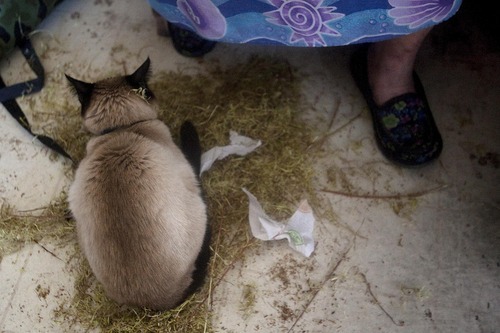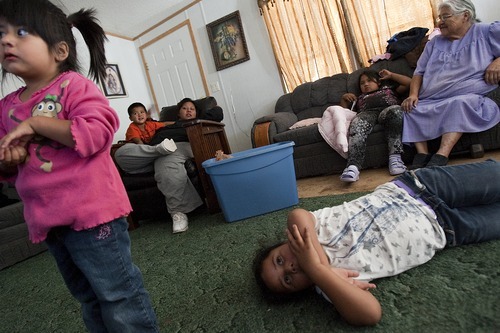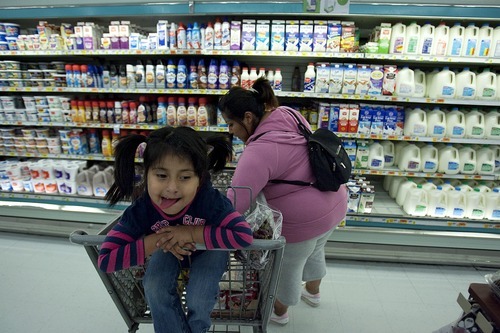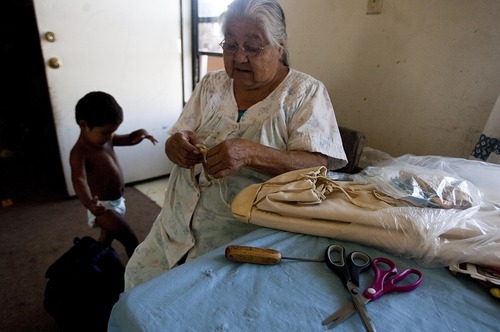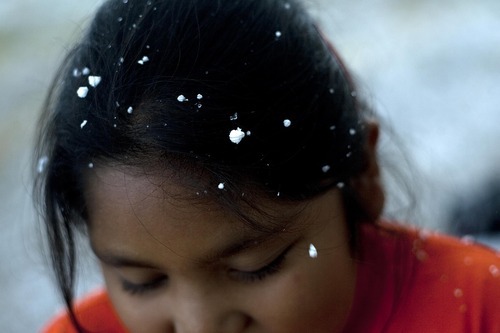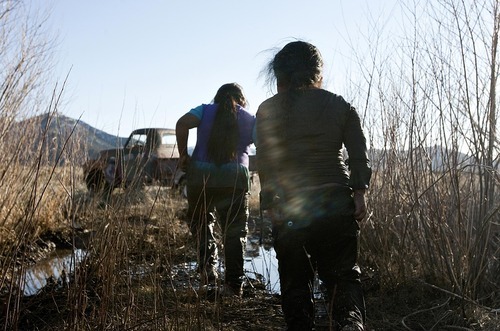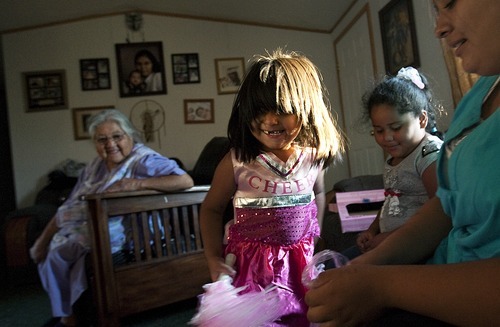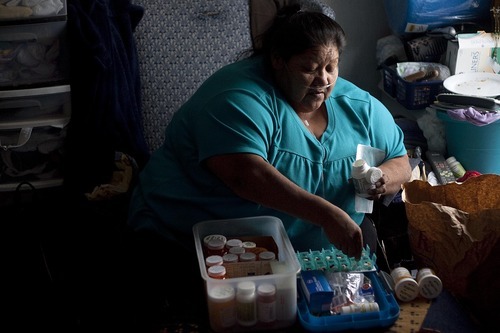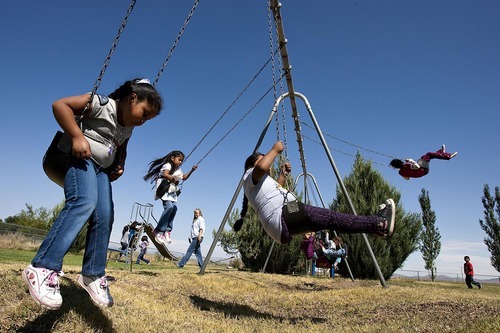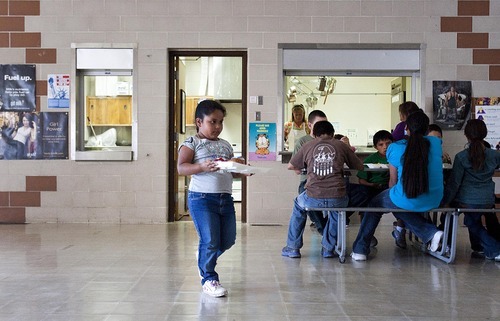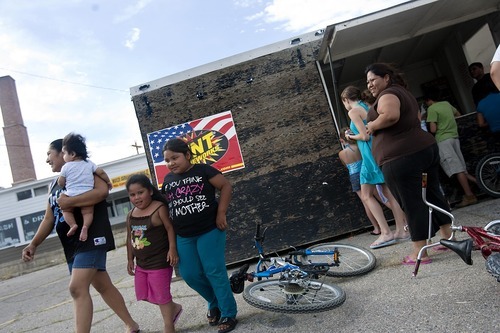This is an archived article that was published on sltrib.com in 2011, and information in the article may be outdated. It is provided only for personal research purposes and may not be reprinted.
Ibapah (Tooele County) • The Goshute reservation at the base of the Deep Creek Range counts less than 200 people whose backyard is an untamed frontier, stirred only by curtains of dust that swirl over cattle trails and occasional cars headed down a single road ground into the land.
Wind tears on stubborn underbrush covering the arid land; some daring blades of grass spear the space between knobby branches. Clouds smother mountaintops that surround the valley where windy pavement straightens out into a vast expanse.
Delia Moon and her mother, Orlena, sit at a table stacked with mail, toys and trinkets. The women don't talk much these days. Four children and a TV do most of the chatting.
As the rain outside turns to snow, they know they will weather what life throws at them, one day at a time. They say they are content despite their struggles.
Mother and daughter — one in her 50s, the other in her 70s — are the backbone of a family of mostly women that spans four generations. The exception is Delia's son, Larry, and her grandson, Adrian, a curious 2-year-old who scampers about the house in diapers, finding things to undo.
Larry lives at home to help as much as he can – financially and with larger chores. Yet the women who surround him have often had to make do without men around.
As life unfolds for the Moons, their routines embody the frailty of Native traditions in their tribe.
Orlena still speaks Goshute, yet the youngest barely understands a few words. The eldest collects firewood in winter and tenderly constructs cradle boards in spring, while the kids watch Disney cartoons and dress up as cheerleaders. Their mothers are caught between trying to tend to their roots and family on the reservation and leaving for work in the casinos of Wendover. They're lured by a life that's faster, with ups and downs that leave them dizzy but independent.
The Moons share problems that too often have come to define their people. Poverty, substance abuse, diabetes and a lack of access to health care to help with these issues have taken their toll.
But as they live in the context of their family, share love for each other and the land they grew up on, they persevere. Their hardships don't recede because of it. But their story goes beyond the troubles.
In their own words, they describe the world they see: a world seen so differently by people living under the same roof.
Orlena McCurdy, age 77
I was born here in Ibapah. All my life I lived here. I guess it's a good place. I'm getting old, and I don't want to go anywhere anymore.
It seems to be changed. When I was young, people used to plant gardens and grain and everything. My grandma, she used to plant a garden and all the elders used to plant gardens. I had my own garden, too, about 30 years ago. It was good; everything grew. I had corn and carrots and everything I planted. I don't think anybody is doing that anymore. It makes me sad a little bit.
I stopped scraping deer hide (to make items including cradleboards, gloves, moccasins or jewelry) but the cradle board I can still work on. The deer hide is a little bit harder because you have to use your hand to cut the hair and then you soak it and then you scrape it. Sometimes it takes two days. I kind of stopped doing that. I used to make beadworkcq, too, but I don't do it anymore. I stopped because my hand was getting numb, and it was hard.
I have seven children, and I have three left. I like to live longer with all my family. They are important to me. I love them. But some of them are gone, and I miss them, too.
I had a son who used to go hunt and do things for me. Now I have a grandson who does things for me. And I have grandchildren. I love my grandchildren. They mean a lot to me. And I have great-grandchildren, too, which is very important. I love them so much it hurts me. That's all I can say about my family.
Delia Moon, age 52
I was born here in Ibapah. Living out here is good. It's nice and peaceful and quiet. Weekdays we hear a few cars go up and down. And when it becomes Saturday, Sunday, it is so quiet you only hear your own family. The closest town where we could get groceries is Wendover and that's an hour drive. But it's always enjoyable to look at the desert when you drive. You get to see wild animals, and you get to see cattle and horses and ranches.
The nearest doctor and hospital is about three hours away. I have to travel … to Salt Lake and then see a doctor, and then get back on with your transporter and come back. And by then you're all burned out. Having to travel that far is tiresome.
The most important thing is family, to have them around you. I have three children and four grandchildren. Family to me means a whole lot of caring, and I'm really glad that I got a family, and I'm glad that I got to stay around to see my grandchildren. It's a handful to take care of them, but they're a lot of fun.
Sometimes I wish I would live in town so I could take the kids to little kiddy activities, but yet I have to think my mom is gonna be left here, and who is gonna watch her? So it worries me, and I'd rather stay with my mother because I don't want her to go into a rest home. She took care of me when I was a little girl. Helped me grow up, cook and wash and sew and everything, and it's my turn to take care of her. That's the way I feel. That's why having a family is really important to me.
My illness. I really don't know what happened to me. I just know I had a rupture in my stomach, and my kidneys were starting to shut down, I was told. And I woke up in the hospital, and I remember some things, but I don't know if they were real or a dream. I was gone from here for three months. And I'm a diabetic, too. Sometimes it's OK but sometimes I do go downhill. But I learned to cope with that.
I'm being so helpless, and it does kind of get to me once in a while. I always apologize to my mom, and I keep telling her I'm sorry. And she says it's OK. But what can I do? Once I get better again, I want to be there to take care of her. I'm going to try so hard just to reverse that. Because I'm not gonna send her anywhere.
I've been telling my kids to go out, go look for some things, maybe another job or move to be on your own because you're gonna get old. But the kids won't go; they're still stuck around here. And for me getting sick, it kind of brought my kids back in. My mom and I try to take care of ourselves. But there are times when we need their help and they're there.
I never really thought about what to expect in life. All I know is that I'm part of the Goshute tribe.
I do try to follow what my traditions are, like prayer meetings, and I like to go to powwows and things like that. But other than that there aren't many things I do nowadays.
A lot of things have changed. Nobody wanna do nothing no more. It would be a good idea to see them keep going. At least the young ones, anyway. There were those girls I knew. They were small at the time. They were all dancers. They were jingle bell dancers and fancy dancers and traditional dancers. There were a whole lot of them out here.
And now … they are no longer dancing, and it's sad to see that. But me, for example, I never forced my kids to participate in that, either, so I could be blamed for it, too. And now my kids are grown up, and they don't force their kids to dance, either. But I know two of my granddaughters really want to dance, they really want to wear their outfits.
The ones that do those crafts, like making cradleboards out of willows, making baskets and making gloves out of buckskin, quite a few of those elders who have been doing it, are basically gone. They passed away so many years ago.
My mom is one that's left. She makes cradleboards. But my mom is suffering from her hands because she is making these cradle boards from scratch. She goes and cuts the willows for the frames. She goes and cuts willows for the shades. They're all different shapes. It's not just any kind of willow that she gets. She calls it something, but I can't remember what kind it is.
If people ask me, I say, yeah, I'm a Native American. That's as far as it goes. I never say I'm so proud to be a Native American because I know everybody is proud to be who they are. It doesn't matter who it is. Everybody has the right to be proud of who they are. All I know is I'm a Native American. That's about it.
Maxine Bishop, age 30
I've been living in Wendover off and on since I was 16. I work in Wendover as a vault cashier.
I have one daughter, her name is LaRae Louise Bishop. She's 7 years old. She goes to school out here (Ibapah). She is in second grade, and she's been living with my grandma since birth. I try to see her as much as I can. This is the first time since two months or a month and a half. I miss her a lot. But since there is no work out here, being away from her is a sacrifice I have to make.
Just this one job is only providing for my living, and first thing Monday I'm gonna have to look for a second job to help my family with her school clothing and what she needs and then that means less visiting time with her. I'm trying to help out as much as I can.
I like to see what I can do on my own without looking at somebody else for it. I hope my daughter sees what I do, and then she could go out there and do the same thing herself. She could be out there making her own money and buying what she wants to buy. And I do tell her that, too, when she is of age she's gonna work and learn how to manage her money.
Being raised just by my mom and seeing how she had to struggle just to support three teenagers made me realize just how strong a person she is. I've seen my mom do [an] oil change and do everything that she could have a man do for her, but she's done it herself.
I've seen my grandma go up in the mountains to get wood. She never depended on a man; she only depended on my brother for the vehicle. The way I look at it, there are some strong women.
People don't understand. Even when some of them come out here and live out here for so long, they will never understand … how us Goshutes have to struggle every single day.
When I was little I really didn't know what being a Goshute was until I grew up and had my own child. Out there dancing, all sorts of stuff that she's doing that I've never even done myself.
I'm happy. I have a family, I have my daughter, the most important thing to me is my little girl. If she lives out here when she's older that's fine as long as she's happy. That's all I want for her is her happiness.
Tarina Bishop, age 29
I've lived in Ibapah Valley all my life. [I have a] lot of good childhood memories, I guess you could say. It's wonderful. I've always believed in trying to conserve what we have. My pastime is just trying to take care of my kids. I want them to grow up the way I did.
I value honoring your elders, just keeping yourself good-minded, putting family first. It changes you to be a stronger person, you know. I could survive if the power went out and never was to come back on. I know how to cook on a wood stove and how to cook over a fire. I know how to sew, wash in a creek. I mean I'm pretty much old-fashioned, the way my family raised me. They never raised me to give in and be lazy with things.
Keeping your family values and making it in the white world is kind of hard. I went to Job Corps (a federal vocational training program) and I had long hair, and I went into welding and I couldn't keep my hair. They told me I had to cut it off. So I had to shave half of it off because I have really thick hair. A lot of people have to leave their traditions in order to make it in the world.
I just don't tell people how my traditions are because they look at me like I'm weird. My superstitions and all these things, they say it's not true. But it's true to me, and I believe in it.
I tried to live like I never was part of this reservation because I got tired of living this way. … I tried to switch and live like the white people, and it's just not for me. Being in a white man's world, that's when I started dabbling in the bad things that they have to offer: being involved in drugs and alcohol. I had to turn to my Native American church to try to heal myself from that. And that seems to be working, so far. I guess you could say I was lost for quite a while, and I'm trying to find myself.
There was more alcoholism when I was younger. A lot of those people have passed on. Alcohol is an ugly thing, and being that it was given to a lot of Native Americans when they were young, it ruined a lot of us. If we didn't get involved in alcohol and drugs and all that, we wouldn't be in the situation that we are in.
If I ever had a chance to go back to a happy time, I would go back to when I was 6 or 7. Living in this world today, it's scary. You're not carefree. You have worries. You are worried about other people. And since my family is so family-oriented, I can't leave my mother or my grandmother to fend for themselves. That's why my brother and me stick so close to them.
A lot of people say they look down on me and my brother. They say, 'Why don't they just move out? They just can't live on their own.' They don't look at the point, like, their grandma is old, their mother is not doing too good. If they need the help, I'm here to help them. I don't know how that feels to anybody else but that's how I feel.
It's part of our traditions that the women take care of the house. People think of that as sexist, you know, women have fought for so many years, but it's just the way things are. In our traditions, we take care of our men, and the men are supposed to take care of us. They're the ones that bring home the beef, the meat; they're the ones that do the hard work, and what's better to repay and give thanks to that man for what he does than to take care of them.
I want to go to school. I want to learn new things, but I'm lost right now. Moving out there on my own, where do I go? Where do I turn when I need help? I'm used to doing things the old-fashioned way. It was hard for me to learn how to use the TRAX. Now that's hilarious. Or I barely started learning how to use the computer. It's embarrassing. I wish I didn't have to. But I want to learn it all because I don't want to be left behind, struggling.
I know a lot of people are fascinated with Native Americans. Different tribes have … different superstitions, different ways. But I feel like mine [my tribe] is not going to be around in the next 10 years, 20 years. I feel like in the next 20 years they're gonna be like, what's your traditions? They're gonna be like, I don't know. What's your traditional food? I don't know. What's the stories that you have?
LaRae Bishop-Moon, age 7
I like to go up in the mountains. Fly a kite.
I like to play with dolls like Sleeping Beauty and Rapunzel. They have dresses. They're pretty. And when you put their dresses in the water they change colors. I like a horse toy and a baby bear.
I like gah-guh (grandmother) and toh-tuh (great-grandmother).
Toh-tuh cooks and she does willows and she does cradle boards and she watches TV and she cooks for our uncle when he gets back from work. They tell us to go play and we go play. They say "hi" when we come back.
Raenee Bishop-Moon, age 6
I'm 6 years old, and I'm a first-grader. I like going to school, having fun.
I have nine parents. They're my family. They take care of me.
I want to be a cowgirl, ride horses and cows. I love to dance. I dance because I want to be special, to win the prize, win the crown. I want to be a powwow princess. I practice dance by myself. I put my hands on my hips like this because my grandma said that.
I want to live somewhere else (when I grow up). Salt Lake City. I want to stay in a hotel room and take driving lessons. I'll visit, and I can come back and see my parents.



